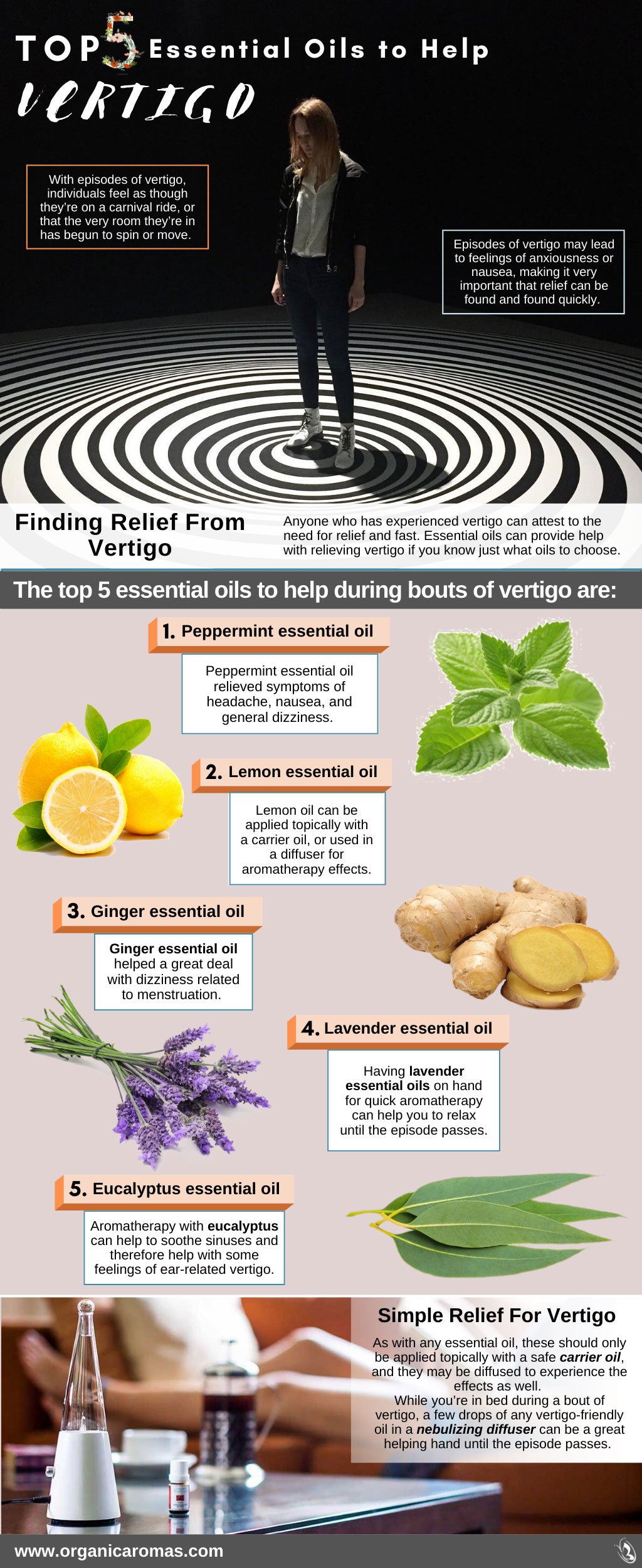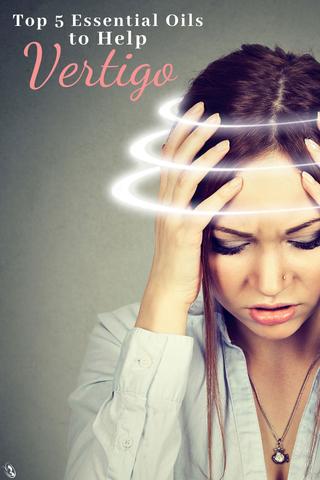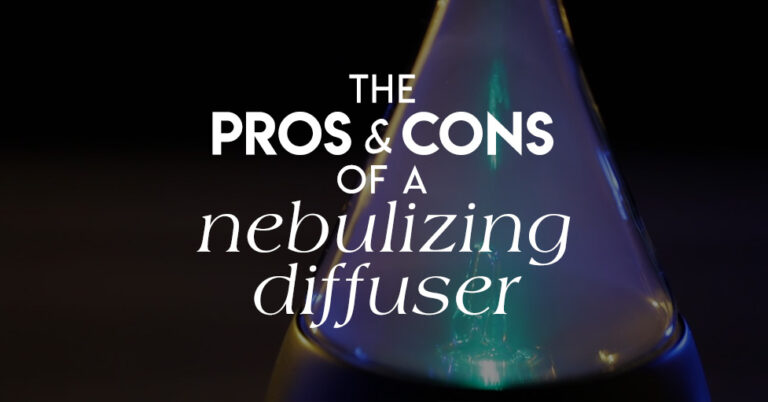Top 5 Essential Oils to Help Vertigo
What is Vertigo?
It’s estimated that right around 69 million people in the United States will be affected by vertigo at some point in their lives. Vertigo isn’t like your typical dizziness, and it’s a much different sensation than the one you may get if you stand up too quickly. When episodes occur, individuals feel as though they’re on a carnival ride, or that the very room they’re in has begun to spin or move. In some cases, an episode of dizziness may cause a person to feel as though they’re unbalanced and falling to one side. This may be quite uncomfortable, but in many cases it’s fairly harmless. Episodes of vertigo may lead to feelings of anxiousness or nausea, making it very important that relief can be found and found quickly.
What are the Different Types of Vertigo?
There are three main types of vertigo: peripheral, central, and positional. Central vertigo can cause prolonged feeling of unbalance and is likely caused by trauma to the brain. Vertigo is a sensation that some may feel during the course of a migraine, and in some instances is considered the central vertigo type due to it’s relation to brain activity.
Far more common than central vertigo is peripheral, which originates from the inner ear. Many don’t know that our ears are our bodies’ central balance centers, and when they get thrown off balance, so do we. Vestibular imbalances caused by the movement of tiny ear stones can lead to feelings of vertigo, an ear infection may cause vertigo, ear injury, air travel when an ear won’t pop, and some external motions can lead to feelings of vertigo as well. In most cases, these episodes of vertigo will last only a few seconds to moments, but they may be recurring until the problem is fixed or goes away on its own.
Positional vertigo is a rare type that is caused by a problem with the movement of the head.
What are the Symptoms of Vertigo?
The symptoms of vertigo can vary depending on the type. However, some common symptoms include:
- A feeling of spinning or dizziness
- Nausea and vomiting
- Loss of balance and coordination
- Difficulty walking or standing
What is the Best Way to Treat Vertigo?
Short episodes are difficult to treat, and some are more prone to episodes of vertigo than others. Often times, doctors will simply prescribe physical therapy and certain exercises to cut down on episodes of vertigo with no exact known cause. This may cut down on symptoms but it won’t eliminate vertigo from your life. Many people find essential oils to be a helpful solution.

Finding Relief From Vertigo with Essential Oils
Anyone who has experienced vertigo can attest to the need for relief and fast. Essential oils can provide help with relieving vertigo if you know just what oils to choose. The top 5 essential oils to help during bouts of vertigo are:
- Peppermint essential oil – Peppermint essential oil is a particularly popular oil for vertigo sufferers. Topically applied or through aromatherapy, a 2013 study showed that peppermint essential oil relieved symptoms of headache, nausea, and general dizziness – which are all feelings associated with a vertigo episode.
- Lemon essential oil – Lemon essential oil has been used for centuries or longer in treating dizziness and vertigo. In a 2014 study broke down just how effective this type of oil is. Lemon oil can be applied topically with a carrier oil, or used in a diffuser for aromatherapy effects.
- Ginger essential oil – Ginger essential oil is a powerful vertigo helper. Mixed with carrier oils and applied to the temples or the abdomen, many found that ginger essential oil helped a great deal with dizziness related to menstruation, and that these effects translate well to cases of vertigo as well.
- Lavender oil – An episode of vertigo can be unsettling, causing to spike feelings of anxiety for many. In turn, these feelings of anxiety can cause you to hyper focus on the vertigo, creating a vicious cycle where your vertigo symptoms feel worse than they actually are. Having lavender essential oils on hand for quick aromatherapy can help you to relax until the episode passes.
- Eucalyptus – In some cases, it can be nasal congestion contributing to your vertigo issue. When our sinuses are inflamed, clogged, or stuffed, fluid may begin to build up in the inner ear, causing these feelings of pressure to spread across the face and into the ears. When this pressure builds up, vertigo can result. Aromatherapy with eucalyptus can help to soothe sinuses and therefore help with some feelings of ear-related vertigo.
Simple Relief For Vertigo
No person, whether very familiar or less than familiar with feelings of vertigo, enjoys the experience. What essential oils bring to the equation is another way to help these sensations, and get you safely back on your feet once again. As with any essential oil, these should only be applied topically with a safe carrier oil, and they may be diffused to experience the effects as well. While you’re in bed during a bout of vertigo, a few drops of any vertigo-friendly oil in a nebulizing diffuser can be a great helping hand until the episode passes.
Pin It!





Thanks, Good information.
I have 3 members of my family that have Vertigo. This article is very informative and taught me a lot about the condition. I will pass on the info about the essential oils to help them.
good to know
I had no idea that they could help with vertigo!
These essential oils sound very useful. Thanks for sharing!
Putting fresh eucalyptus in your shower is amazing! Peppermint oil is super for so many things!
I am lucky never had vertigo before and hope I don’t know. But I will remember about this
I need the recipe for this. I have vertigo and need help with it
I like the idea of pure oil use only! Planning to order for my spa
Would this help with chronic migraines? One is sensitive to scents.
I need to learn more about essential oils! There are so many great benefits that I did not know about, like this one! Thanks for sharing!
I would love to try something for my nausea.
I will have to learn more about essential oils they sound so great!
I like the selection of scents!
This looks like very good info. Sent it to my niece! Thank you. She had vertigo since over a month…
Wow, did not know about this! This is really helpful information. Thank you!
This is amazing!! I’ve struggled with vertigo for so long. I would love to find something that could help!!! This is so wonderful.
I definitely want to try this I love hiking but I get vertigo on steep climbs.
Aromatherapy is more powerful that one thinks.
I really appreciate this article. I suffered from vertigo due to a side effect of a medication I was taking. I was so miserable. I can’t imagine having this condition all the time. Horrible feeling.
Will pass this info along to a friend who suffers from vertigo.
I didn’t know that essential oils can help relieve the symptoms of vertigo. This is great information! Thanks!
sending this link to my mom! thanks for posting!
Its amazing what Oils can do to the body. We are so used to modern medicine!
It is so cool the things oils can do for our bodies. I never would have thought that vertigo could be treated with essential oils
Wow, my friend Dorothy will be thrilled to hear of this product!
Only have met one person ever that had vertigo, good to know!
I get this once in a while, good to know!
I imagine vertigo must be awful to deal with so happy that there are some natural remedies to relieve symptoms.
I love peppermint!
I didn’t know about vertigo, you have to try it. Thanks for the info.
Wow, its,so, good, that, this, can, Help, Vertigo
Wonderful information. I had no idea that essential oils could help vertigo.
wow remarkable
essential oils can do so much it is amazing
I had no idea thank you so much
wonderful information ty
Thanks
Thanks for the share
Thank you very much for this information, very useful.
I don’t have vertigo but I definitely have used some of these essential oils in my bath bombs.
Thanks for the share. I know people who have vertigo. Thanks.